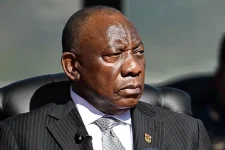South African Land Law Sparks International Tension.
Tech billionaire Elon Musk and U.S. President Donald Trump criticized South Africa's new land reform law this week, prompting President Cyril Ramaphosa to respond directly.
Trump threatened to halt U.S. funding to South Africa, claiming the country "confiscates land" and mistreats certain groups. Musk, born in South Africa, questioned Ramaphosa on X about "openly racist ownership laws."
President Ramaphosa defended the legislation in a call with Musk, emphasizing South Africa's commitment to the "rule of law, justice, fairness, and equality."
The recently signed law permits land seizures without payment under specific conditions. These include abandoned properties or those posing public safety risks. Ramaphosa stressed that his government "has not confiscated any land."
Trump escalated his criticism on Truth Social, announcing plans to suspend funding pending an investigation. At a press briefing, he accused South African leadership of "terrible things, horrible things."
Land ownership remains a central issue in South Africa. According to recent government data, white individuals own 72% of private farmland despite representing 7.3% of the population.
The roots of this disparity trace back to the 1913 Natives Land Act. This colonial law restricted Black property rights, leading to decades of forced relocations until apartheid ended in 1994.
Nelson Mandela became South Africa's first democratic president that year. Yet land reform progressed slowly under the previous "willing seller, willing buyer" policy.
Critics warn the new law might harm the economy and deter investors, drawing parallels to Zimbabwe's land seizures. Supporters argue it addresses historical injustices from racial segregation.
The legislation marks a significant shift in South Africa's approach to land reform thirty years after apartheid ended. It aims to balance constitutional rights with the need to correct past inequities.
Tech billionaire Elon Musk and U.S. President Donald Trump criticized South Africa's new land reform law this week, prompting President Cyril Ramaphosa to respond directly.
Trump threatened to halt U.S. funding to South Africa, claiming the country "confiscates land" and mistreats certain groups. Musk, born in South Africa, questioned Ramaphosa on X about "openly racist ownership laws."
President Ramaphosa defended the legislation in a call with Musk, emphasizing South Africa's commitment to the "rule of law, justice, fairness, and equality."
The recently signed law permits land seizures without payment under specific conditions. These include abandoned properties or those posing public safety risks. Ramaphosa stressed that his government "has not confiscated any land."
Trump escalated his criticism on Truth Social, announcing plans to suspend funding pending an investigation. At a press briefing, he accused South African leadership of "terrible things, horrible things."
Land ownership remains a central issue in South Africa. According to recent government data, white individuals own 72% of private farmland despite representing 7.3% of the population.
The roots of this disparity trace back to the 1913 Natives Land Act. This colonial law restricted Black property rights, leading to decades of forced relocations until apartheid ended in 1994.
Nelson Mandela became South Africa's first democratic president that year. Yet land reform progressed slowly under the previous "willing seller, willing buyer" policy.
Critics warn the new law might harm the economy and deter investors, drawing parallels to Zimbabwe's land seizures. Supporters argue it addresses historical injustices from racial segregation.
The legislation marks a significant shift in South Africa's approach to land reform thirty years after apartheid ended. It aims to balance constitutional rights with the need to correct past inequities.












